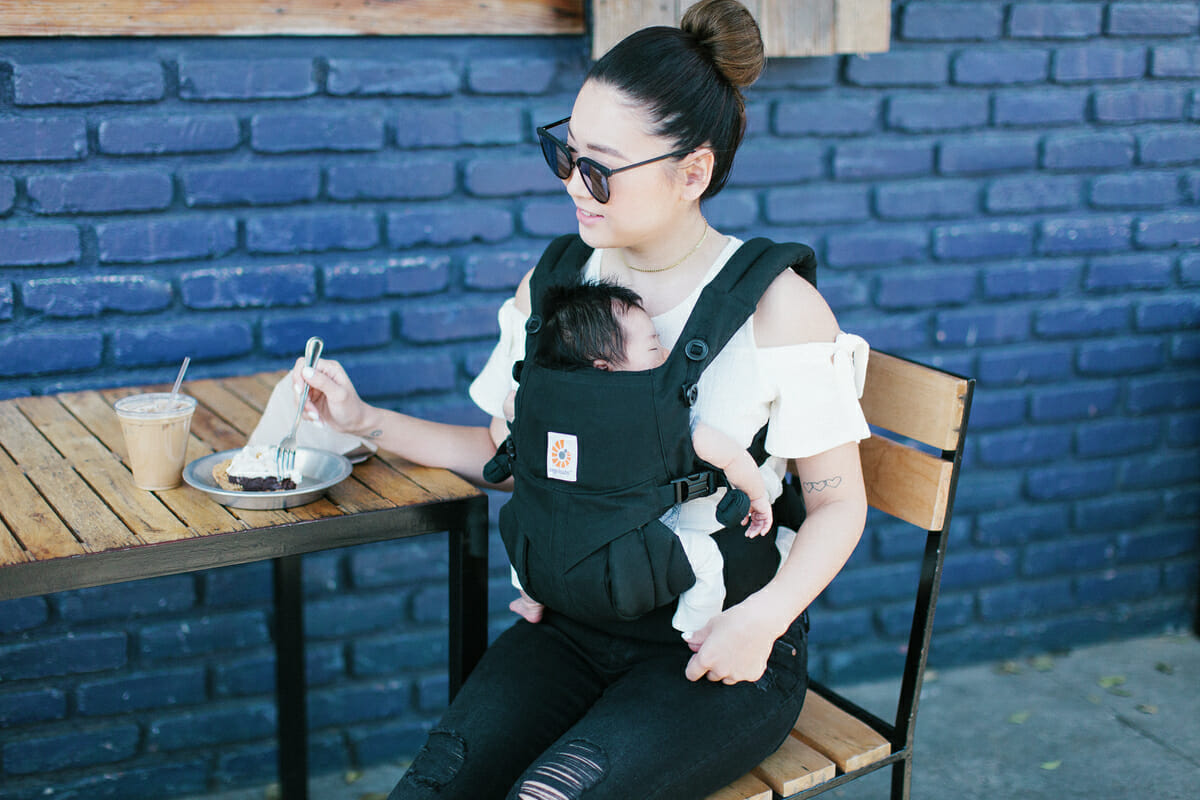
Babywearing is helpful for when you want to hold a baby and have your hands free, and can be more convenient than a stroller when out and about. But did you know that babywearing can also help with postpartum mental illness, such as anxiety and depression?
Babywearing passively comforts a child
Symptoms of clinical postpartum anxiety, depression, or other postpartum illness, can make it hard for a parent to feel “present” let alone focus on the baby. I often suggest babywearing to my clients, and coach them to start a habit of kissing the baby’s head, and letting the baby cuddle. Even a parent that feels low energy or less than 100% can passively be a loving safe-haven to their child by wearing him or her.
Wear your child to soothe your anxiety
For parents with anxiety, OCD, or fears of something being wrong with the baby, babywearing can also be an easy way to feel comfort. You can go ahead and pat the baby there on your chest as often as you like and get the comfort of feeling the baby breathing, secure knowing baby is there and safe. For a colicky baby or a baby with a difficult temperament, babywearing can minimize baby’s crying.
Babywearing can help grow our love
So, I’m just going to say it: not all mothers feel “love at first sight” for their newborn. Risks factors that can increase the chances that a new mom will not attach immediately to her baby include:
• An unplanned pregnancy
• Conflict with or separation from the partner
• A traumatic birth
• Pregnancy that is the product of rape
• Any kind of resentment towards pregnancy, birth or the transition to motherhood
• Maternal mental illness
• Or a baby with a difficult temperament.
“Aren’t you just in love?” well-meaning strangers always ask new moms. For some, no, they simply aren’t in love. At least not yet. They may be sleep-deprived, recovering physically, anxious, depressed, or resentful. Yet few will ever admit it publicly. It’s just not socially acceptable to post on Facebook. And then comes the guilt. “Am I some kind of monster that doesn’t love their child?”
I like to give my clients struggling with poor attachment hope. If they don’t feel love at first sight, they can still hope to develop a loving relationship. Think of it as an arranged marriage. Many in arranged marriages grow to love each other. Some lucky ones may be attracted to each other right away, but the majority take a little bit of time and a little bit of work to reach love.
Babywearing can help grow attachment
All you really have to do is be a warm body! Make it a point to wear your baby every day. If your child tends to be fussy at a certain time a day, that is a great time to start. Other interventions for improving attachment include practicing baby massage or taking a mom and baby class. Try a babywearing dance class!
One other intervention for poor mother-baby attachment is to spend 15 minutes a day totally focused on the child. Yes… that’s it. Just 15 minutes. (Side rant: How many of you feel guilty if you EVER “check out” and watch TV or surf social media on your phone? Don’t. Please don’t. It’s actually healthier to be your own person than to be a helicopter parent.)
Final thoughts
Developmental Psychology has taught us that baby humans, like baby monkeys, need a loving and well-attached mother in order to have healthy development. I don’t believe that is entirely true. Any well-attached and healthy parental figure can provide a benefit to a growing child. It does not necessarily have to be the biological mother. For dads/partners and adoptive parents, babywearing is a great way to mimic the physical closeness of pregnancy.
And remember: Parenthood is a new job – look at your expectations on yourself. It takes six months, on average, to adjust to any new job – and this job keeps changing. Just when you get used to a newborn, you end up with an older baby, eating solids, crawling… And just when you feel comfortable with a sleep routine, you hit the four month sleep regression and everything goes out the window.
You are doing great! Keep your head up and your baby close!






